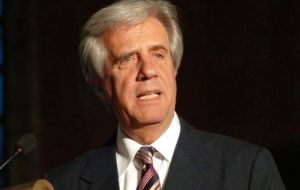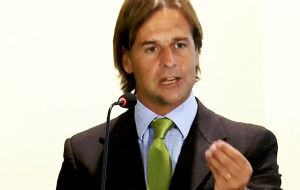MercoPress. South Atlantic News Agency
Uruguay's presidential election too close and 'unpredictable', argue pollsters
 Vazquez speech must help him retain activists but also attract independents
Vazquez speech must help him retain activists but also attract independents  Lacalle Pou 'can say almost whatever the wants' and his followers feel victory is at the reach of hand
Lacalle Pou 'can say almost whatever the wants' and his followers feel victory is at the reach of hand The strong economy and the good image of the incumbent presidential candidate Tabare Vazquez are not sufficient for Uruguay's ruling coalition Broad Front to ensure a third consecutive mandate next Sunday 26 October, according to the country's main pollsters, who underlined that the election result at this stage is too close and 'unpredictable'.
“The political debate has now focused on how much of the economic bonanza is 'tail wind' or performance from the Broad Front, or if the coalition did sufficient to make the most of the global conditions favoring Uruguay as an exporter of commodities: nevertheless economic growth is a fact and so are its social consequences”, said Luis Eduardo Gonzalez, head of pollster Cifra, during an electoral debate at Montevideo's Catholic University.
”With the same Broad Frond that in 2004, (when the first victory), with the same targets and in a far better country, Vazquez can't insist with the same speech or make the same kind of campaign that back then“, added Gonzalez.
The pollster said that the position of former president Vazquez, running for a second time, is far more vulnerable than that of current president Jose Mujica when he was elected in 2009, despite the fact people support the management of the economy and his presidential performance.
”Why Vazquez could lose?“ asked Gonzalez. One reason is that the 'fat cows are not looking that fat anymore' and there are issues such as education and security and crime that outstand as great liabilities and are in the heart of the electoral campaign.
”Uruguayans feel things are running“ said Ignacio Zuasnabar, head of the other big pollster Equipos; however ”the tail wind is not as strong as it was back in 2009“.
”Uruguayans feel things are not going badly but also feel they are not going that sufficiently good as they would like“, added Zuasnabar.
According to Gonzalez the main opposition presidential candidate, Luis Lacalle Pou is enjoying some of the same benefits of Vazquez when he first bid for president in 2004. ”Today, Lacalle Pou can say almost anything he feels“.
Furthermore his party and supporters are highly motivated: ”they feel victory as never before in the last fifteen years is at the reach of the hand, and thus don't care if the candidate is too tolerant with the Broad Front. As his campaign slogan, 'let's be positive'“.
In this scenario Vazquez is between the sword and the wall.
”If the says what his supporters and activists want him to say, he runs the risk of losing in the runoff because he could alienate moderates and independents. If he says what the unsatisfied pretend, those who have no definition yet, activists could turn their back on him“.
Gonzalez believes that Vazquez' main challenge remains in finding an only speech which helps to retain voters and convince the others he needs to ensure victory.
All public opinion polls released and published indicate that the Broad Front has a ceiling of 41%; Lacalle Pou and the National party, 29% and the junior opposition Colorado party 15%, plus the remaining divided among miniscule parties, the undecided and those who pledged to vote blank.
Even Gonzalez and Zuasnabar agree that the 26 October results at this stage are 'unpredictable' and can't be forecasted, but some facts seem quite clear.
For Zuasnabar the runoff is a fact, there's no way of avoiding it because the Broad Front won't reach the 50% of ballots. And the runoff is an open result.
Likewise the legislative majority for the Broad Front, as it enjoyed in the 2004 and 2009 elections, mathematically could be achieved, but is highly uncertain.
Zuasnabar also pointed out to a more volatile voter than in previous elections. ”You can't discard some last minute movement that at the moment we are not detecting with our current system of public opinion polls“
However and summing up Gonzalez said some 'continuities' can be expected: ”for one in 2014 the parties system of the last fifteen years will remain with two politically divided halves, and the Broad Front will continue as the political organization with most votes“.
And since it's an open race: Vazquez or Lacalle Pou can win, this means that ”the Broad Front will become the smaller half (compared to the so called traditional parties in Uruguay, National and Colorado), but it could retain government“.
However the head of Cifra was very cautious ”we are talking of expectations and not of forecasts”.




Top Comments
Disclaimer & comment rules-

Read all commentsGO, GO, Pou!
Oct 18th, 2014 - 04:05 pm 0Commenting for this story is now closed.
If you have a Facebook account, become a fan and comment on our Facebook Page!